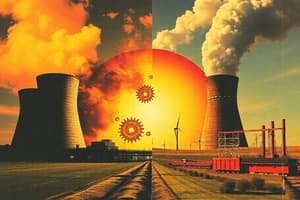Podcast
Questions and Answers
Which statement best describes the benefits that would make the investment in nuclear fusion worthwhile?
Which statement best describes the benefits that would make the investment in nuclear fusion worthwhile?
- Fusion produces no radioactive waste, and the fuel is plentiful. (correct)
- Fusion requires a large amount of energy and occurs in stars.
- Fusion produces large amounts of energy, and the fuel is found on Earth. (correct)
- Fusion requires little energy to begin and would continue through a chain reaction.
Which is most likely why many scientists reject the cold fusion theory?
Which is most likely why many scientists reject the cold fusion theory?
- There is too much waste involved in the process.
- The process does not produce enough energy to meet the needs of modern humans.
- The original results have not been replicated consistently and reliably. (correct)
- Cold fusion experiments have been conducted at room temperature only.
Which statement is true about nuclear fusion?
Which statement is true about nuclear fusion?
- It has very low activation energy.
- It does not occur naturally in the solar system.
- It produces nearly all the elements that are heavier than helium. (correct)
- It is caused by the same process that causes nuclear fission.
How does critical mass play a role in nuclear reactions?
How does critical mass play a role in nuclear reactions?
Which is a characteristic of nuclear fusion?
Which is a characteristic of nuclear fusion?
Why is it important for scientists to replicate each other's experiments?
Why is it important for scientists to replicate each other's experiments?
Which equation demonstrates that nuclear fusion forms elements that are heavier than helium?
Which equation demonstrates that nuclear fusion forms elements that are heavier than helium?
Which element is nuclear fusion least likely to produce?
Which element is nuclear fusion least likely to produce?
Which type of reaction does this diagram represent?
Which type of reaction does this diagram represent?
Which is a characteristic of nuclear fusion but NOT nuclear fission?
Which is a characteristic of nuclear fusion but NOT nuclear fission?
Which best describes what forms in nuclear fusion?
Which best describes what forms in nuclear fusion?
Which best describes nuclear fission?
Which best describes nuclear fission?
Which statement is true about nuclear fusion?
Which statement is true about nuclear fusion?
Which statement is true about this reaction?
Which statement is true about this reaction?
Flashcards are hidden until you start studying
Study Notes
Nuclear Fusion and Fission Overview
- Nuclear fusion requires substantial investment for research, but offers benefits such as abundant fuel from Earth and the production of large energy amounts without radioactive waste.
- Cold fusion theories are largely dismissed by scientists due to unreliable replication of original experimental results.
Characteristics of Nuclear Fusion
- Nuclear fusion involves the collision and combination of two atomic nuclei, resulting in a heavier nucleus.
- It requires low activation energy to initiate and occurs in stars naturally, making it a potential energy source.
- Fusion typically creates elements heavier than helium, indicating a transformative process at atomic levels.
Importance of Critical Mass
- Critical mass is essential in fission reactions, denoting the minimum material needed to sustain such reactions.
- For fusion, critical mass does not apply in the same way; the process is driven by light nuclei combining rather than splitting heavy nuclei.
Energy Production
- Nuclear fusion releases large amounts of energy, much more than typical fission reactions, and powers stars, including the Sun.
- Unlike fission, fusion does not produce significant radioactive waste, enhancing its potential as a clean energy source.
Replication of Experiments
- Scientific progress relies on the replication of experiments to verify results, affirming reliability and credibility in findings.
Reactions and Products
- Nuclear fission can produce energy through the collision of a nucleus with a neutron, while fusion combines lighter nuclei.
- Fusion is less likely to produce lighter elements such as hydrogen compared to heavier elements like chlorine or argon.
Summary of Reaction Characteristics
- In fission, energy is released when unstable nuclei split, while in fusion, the combination of nuclei results in a more stable, larger nucleus.
- Practical applications of fusion for energy generation are still in research phases, with no current effective methods for use on Earth.
Studying That Suits You
Use AI to generate personalized quizzes and flashcards to suit your learning preferences.




